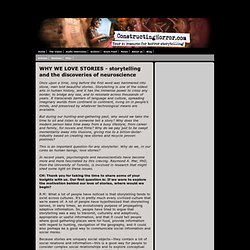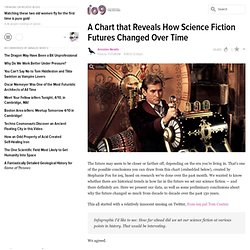

10 Recent Science Fiction Books That Are About Big Ideas. WHY WE LOVE STORIES - storytelling and the discoveries of neuroscience. Once upon a time, long before the first word was hammered into stone, man told beautiful stories.

Storytelling is one of the oldest arts in human history, and it has the immense power to cross any border, to bridge any sea, and to resonate across thousands of years. It transcends barriers of language and culture, spreading imaginary worlds from continent to continent, living on in people’s minds, and preserved by whatever technological means are available. But during our hunting-and-gathering past, why would we take the time to sit and listen to someone tell a story? Why does the modern person take time away from a busy lifestyle, from career and family, for novels and films? Why do we pay just to be swept momentarily away into illusions, giving rise to a billion-dollar-industry based on creating new stories and recycle proven plotlines?
This is an important question for any storyteller. CH: Thank you for taking the time to share some of your insights with us.
Industrial Design in Sci Fi. Films. Science Fiction Prototyping: Designing the Future With Science Fiction - Brian David Johnson. A Chart that Reveals How Science Fiction Futures Changed Over Time. One thing that fascinates me about SF is what gets rejected as proper, serious science fiction over time.

Up until 1980, there were dozens of short stories and novels published every year about psi powers and telepathy, some of which were nominated for or won the major awards in the field, and at least a few of which were considered the finest the genre had to offer — Sturgeon's More Than Human, Heinlein's Stranger in a Strange Land, Silverberg's Dying Inside. In fact, John W. Campbell Jr., who was one of the genre's dominant editors from the '30s until his death in the early '70s, was a deep and sincere believer in the reality of psionics.
After that, though, you saw very few straight SF novels about the subject — it was mostly seen in comics like Uncanny X-Men, or horror/suspense books by King and Koontz, "science fantasy" like Bradley's Darkover novels, or media and related tie-ins like Star Wars, Star Trek, etc.
Suspension of Disbelief. Laws of Sci-fi. The History Of Product Placement In Science Fiction. I suppose that we want to avoid product placement, intentional or not, we'd have to watch fantasy movies about alternate worlds, like Lord of the Rings, Conan or something.

Gandalf or Ged isn't going to be found chilling in the sunset with a Miller beer or Winston cigarettes in his hand. Time travel movies wouldn't be safe because characters from our logo filled present day could bring their mental pollution into the past or future. Anyway, I guess I only really object to this if it's blatantly obvious that plot was warped to depict a product in an important or positive light. If the astronaut hero says, "Gosh, I would have never escaped from the Jovian Ice Prison if it wasn't for that empty can of Coca Cola [Or bag of Skittles or Leatherman multitool, etc. ]!
" That's blatant and ruins my suspension of disbelief. What I object to mostly in our Space Merchants-like present is that fact that I'm give no choice to pay more and avoids ads entirely.